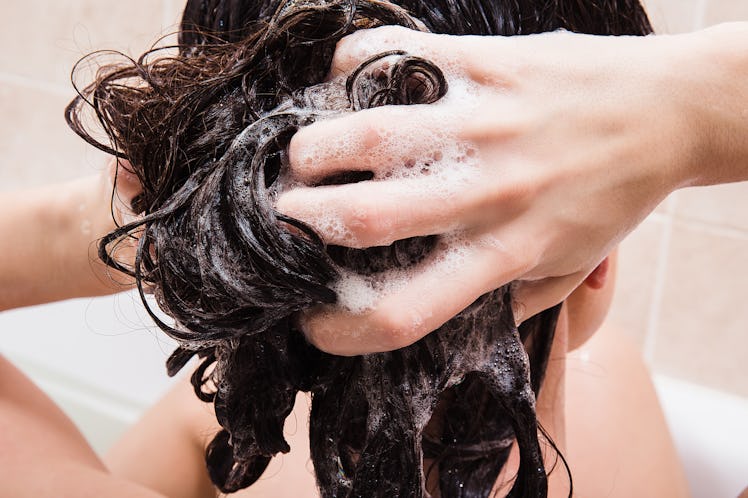
There's A Reason Why You're Losing So Much Hair Right Now, But Here's When It Becomes A Red Flag
I’ve come to realize that no matter what length of hair you have, there will always be a few straggler strands clogging up the shower drain. So while your first instinct when you catch a major cluster may be to low-key freak out and ask yourself “why am I losing so much hair,” science wants you to know there’s probably no need to panic. According to new research, shedding hair is quite normal, especially in the fall and summer seasons.
Actually, science has been on top of this hair-shedding phenomenon for quite some time now, which goes to show it’s not an uncommon concern for women and men alike. So while the fact that hair shedding being pretty normal isn’t exactly “news” to us, the idea that there are peak seasons for hair loss is.
Based on their analysis of Google search patterns related to hair loss from Jan. 2004 to Oct. 2016, researchers from John Hopkins University School of Medicine in Maryland concluded that there appears to be more of a concern around hair shedding during fall and summer seasons. Medical Daily reports that study lead researcher and senior author Dr. Shawn Kwatra believes this data can help to further enhance hair loss treatments moving forward.
But if hair loss isn't always a medical issue, why do people lose their hair in the first place?
People lose their hair every day. Strands are tugged out of place when you hurriedly brush through them, a few hairs are shaken loose and fall to the floor mid-blow out, and you’re bound to notice a clump or two clinging to your damp fingers after a vigorous shampoo treatment. Hair loss is almost a daily occurrence for most people, and it’s usually just a circumstance of simple anatomy.
According to hair restoration expert Dr. Robert Dorin, because women have higher rates of telogen (aka the resting phase of the hair follicle) during extreme weather conditions, they are privy to more falling out. Basically, it’s a completely normal process you shouldn’t stress about.
You’ve heard the saying "what goes up must come down," right? Well, in terms of our hair, what falls out will normally grow back. Dr. Dorin told InStyle that as hair falls out, “hair regrowth is occurring as well,” and as long as you're not noticing balding areas or hair growing thinner, “new hair will regrow and your hair will be fine.”
However, hair loss can sometimes be a red flag for serious health complications.
Of course, there’s a pretty big difference between a few strands coming loose in the shower and spotting areas of balding. If a few strands here and there becomes a situation of clumpy fallout and/or thinning at the scalp, you should absolutely seek medical attention ASAP, as these could be potential signs of minor to serious health complications.
For instance, stress can be a leading cause of hair loss. When you’re experiencing intense emotions of grief, trauma, or anxiety, your body pulls all its resources to push you through the hard times, which can cause your hair to stop growing altogether.
It’s also important to keep in mind that our hair thrives from the nutrients we feed our bodies, so if you’re noticing a dramatic shift in texture or patches of skin, it might be worth reviewing the different kinds of foods you’re eating and what essentials you may be lacking. For example, hair grows healthy when it's being nourished with protein. If you’re noticing an increase in fallout, you may not be fueling your body with enough protein to produce new hair cells.
Things like iron and vitamin B12 deficiencies can also lead to hair loss, as well as hormonal imbalances and thyroid conditions. Anabel Kingsley, a leading trichologist at the Philip Kingsley Clinic in London, told Cosmopolitan UK that because your thyroid glands control your body’s production of proteins and tissue use of oxygen, an imbalance can directly affect hair follicles.
In more extreme cases, hair loss can also be a sign of polycystic ovarian syndrome, lupus, autoimmune disease, and heart disease.
The good news is, most cases of hair loss are treatable.
For those experiencing seasonal hair loss, there are countless lines of shampoo, conditioner, and over-the-counter masks that can help restore your hair's thickness and control major fallout. But, if seeing a bunch of strands slither toward your shower drain has you in a panic, it's definitely worth a trip to the dermatologist to get a) peace of mind and b) specific treatments catered to your issues.
If you're looking for additional support for seasonal hair loss, you may want to consider adding a hair growth vitamin like biotin, fish oil, or zinc to your medicine cabinet. That way, you'll not only be nourishing your hair on the outside, you're strengthening follicles on the inside as well.